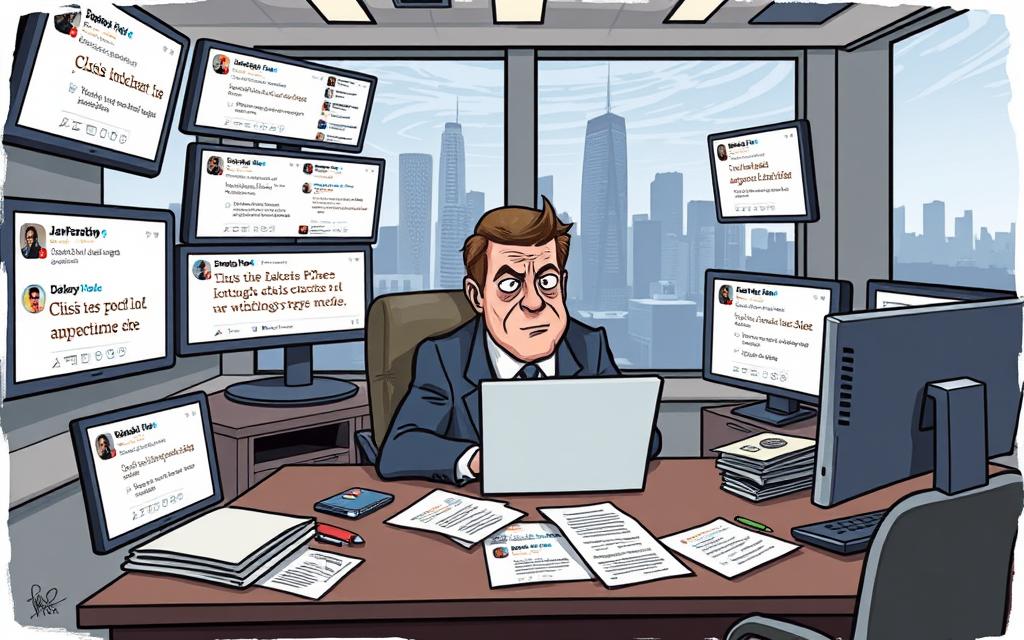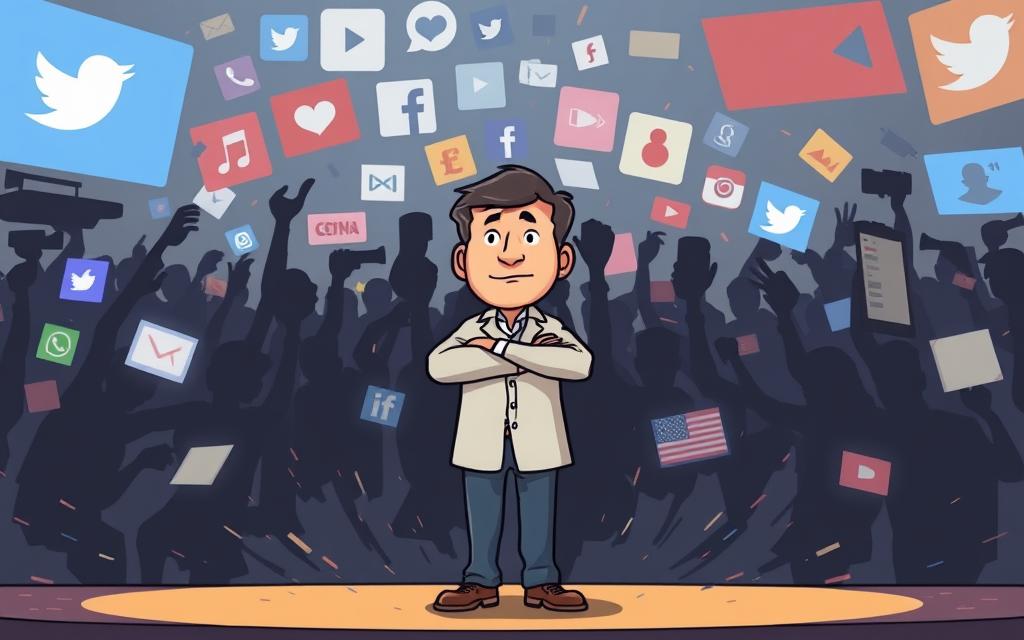Public figures are always under the spotlight. Celebrities, politicians, and business leaders are watched closely by the media and the public. It’s crucial to keep a good image.
Even the most famous can face a reputation crisis. This can be very damaging and last a long time if not handled right.
This article will give you tips on how to deal with a reputation crisis. We’ll talk about how to act before a crisis and how to face it head-on. We’ll also cover how to manage a public figure’s reputation crisis and reduce its impact on your career.
Key Takeaways
- Understand the importance of maintaining a positive public image as a public figure
- Develop a strong personal brand and practice honesty and transparency
- Build a team of trusted advisors to help navigate a reputation crisis
- Use social media responsibly and address issues head-on
- Develop a comprehensive crisis management plan and regularly monitor your reputation
What is a Reputation Crisis for a Public Figure?
A reputation crisis happens when something a public figure does gets a lot of negative attention. This could be a bad statement, a scandal, or a failure in their work. A damaged reputation can lead to losing endorsements, less public support, and even end their career. Reputation Return has a solution.
Importance of Maintaining a Positive Public Image
Keeping a good public image is key for public figures. It builds trust and credibility. A positive image can lead to new chances, but a bad one is hard to fix.
Common PR Issues Faced by Public Figures
Public figures often face scandals, controversies, and negative media. They also deal with backlash on social media. These crises can hurt their career and reputation a lot.
| PR Issue | Percentage of Reputation Crises |
|---|---|
| Scandals and Controversies | 78% |
| Offensive or Insensitive Statements | 89% |
| Negative Media Coverage | 64% |
| Social Media Gaffes | 53% |
These numbers show why public figures need to manage their reputation well. They must be ready for crises to keep their image strong and trust from the public.
“It takes less than one second for a mistake to spread across social media and quickly damage a personal reputation.”

Proactive Measures to Avoid PR Issues
As a public figure, it’s key to manage your reputation well. A strong personal brand with clear values and a consistent message builds trust. Always be honest and transparent to keep a positive image and avoid scandals.
Develop a Strong Personal Brand
Creating a strong personal brand is vital. It should match your values and appeal to your audience. Choose what you share and how you present yourself online carefully. This helps control how people see you.
Practice Honesty and Transparency
In today’s world, honesty and transparency are essential. Address issues quickly and share information openly. This builds trust and prevents damaging rumors.
By being proactive, public figures can manage their image better. A strong personal brand and honesty are key. They help you handle online attacks and crises effectively.

“In a world of social media, the power of a personal brand is undeniable. Build one that reflects your true self and values.” – Oprah Winfrey
Build a Team of Trusted Advisors
Handling bad press as a public figure is easier with a team of trusted advisors. This team might include lawyers, PR pros, and other experts. They offer insights and guidance to help you tackle PR issues and make smart decisions.
Scandals, controversies, and negative media can harm your reputation. Social media mistakes can also damage your image. A team of advisors helps you prepare for these challenges and protect your public image.
These advisors help you create effective communication plans and manage crises. They also offer support and expertise during tough times. This helps you make decisions that protect your reputation.
When picking advisors, look for those with a track record in crisis management. They should understand the challenges public figures face and know how to handle them.
Your crisis team should have clear roles and responsibilities. This includes a crisis manager and subteams for operations, planning, logistics, and finance. A well-structured team is key to handling bad press and reputation crises.
With a team of advisors and a solid crisis plan, you can protect your public image. This helps maintain the trust of your audience.

| Role | Responsibilities |
|---|---|
| Crisis Manager | Oversees crisis planning and response, makes major decisions, monitors and mitigates risks, ensures safety of employees and stakeholders |
| Operations Team | Handles the immediate crisis response and management of the situation |
| Planning and Intelligence Team | Gathers and analyzes information, develops strategies and plans for crisis response |
| Logistics Team | Ensures the necessary resources and support are available for the crisis response |
| Finance Team | Manages the financial aspects of the crisis response, such as budgeting and cost control |
“Effective crisis management is not just about responding to the immediate situation, but also about planning and preparing for potential crises. By building a strong team of trusted advisors, public figures can be better equipped to handle bad press and reputation crises when they arise.”
Use Social Media Responsibly
As a public figure, your social media can either help or hurt your reputation. It’s a great way to connect with people and build your brand. But, it can also be risky if not handled right. To deal with social media during a crisis, it’s key to use it wisely.
Be careful about what you post online. Stay away from anything that might seem offensive or not professional. Your online presence shows who you are to the public, so treat it with great care.
Also, be ready to handle any negative comments or attacks online quickly and well. It’s important to respond to all comments, good or bad, to keep things open and honest. By keeping an eye on your social media, you can lessen the harm to your reputation. This shows you’re committed to clear and honest communication.
Leverage Social Media for Crisis Communication
In a crisis, social media can be a strong tool for talking to people. Platforms like Twitter and Facebook are great for sharing updates and talking to your followers. But, you need to use social media smartly. Make sure your messages are clear, open, and fit the situation.
- Have a team ready to handle social media during a crisis.
- Have messages ready for different situations to respond quickly and in the same way.
- Watch social media closely to catch and fix any problems fast.
- Use the social media of important people, like CEOs, to share real messages during a crisis.
- Always check if your social media plan is working and change it if needed.
By using social media wisely, public figures can handle crises better. This helps protect and even improve their public image.

“Social media can be a double-edged sword for public figures. When used responsibly, it can be a powerful tool for building your brand and connecting with your audience. However, if not managed carefully, it can also be a liability that can severely damage your reputation. The key is to strike the right balance and approach social media with a strategic mindset.”
Address Issues Head-On
In a public relations crisis, it’s key for figures to face the issue directly. They should apologize for mistakes and listen to feedback. Ignoring the problem only makes things worse. Facing it head-on can help fix the damage to their reputation.
When a crisis hits, quick and effective responses are vital. A good crisis plan is essential. It should cover risks, strategies, and keeping stakeholders informed. Regular drills help teams stay ready for any crisis.
Being honest and open is crucial in a crisis. Figures should own up to their mistakes. This builds trust and helps lessen the crisis’s impact.
Keeping stakeholders updated and answering media fast is important. It helps control the story and stops rumors. Showing empathy also helps rebuild trust and connect with the public.
By tackling issues directly, figures can manage a crisis well. This needs careful planning, honesty, and responsibility. It’s the best way to handle a tough situation.

| Scenario | Crisis Response | Outcome |
|---|---|---|
| Target data breach (2013) | Promptly addressed the issue, apologized, and implemented security measures | Regained public trust and mitigated long-term damage to reputation |
| BP oil spill (2010) | Initially slow to respond and take responsibility, leading to public backlash | Severe damage to BP’s reputation, resulting in significant financial and legal consequences |
| Starbucks racial bias training (2018) | Swiftly closed 8,000 stores for racial bias training, demonstrating a commitment to addressing the issue | The incident sparked a nationwide conversation on diversity and inclusion, and Starbucks was able to regain public trust |
The rise of cancel culture and 24-hour news demands clear crisis handling. How public figures should apologize after a crisis and when public figures should address negative publicity are key. Facing issues directly helps regain trust and repair reputation after a crisis.
Develop a Crisis Management Plan
As a public figure, having a solid crisis management plan is key. It outlines steps and strategies for handling PR issues. This includes knowing who to talk to, how to communicate, and how to respond.
To make a good crisis management plan, focus on these important points:
- Choose a crisis leadership team: Pick trusted advisors and experts to help you through tough times.
- Look at possible risks: Do a deep analysis to find and rank crisis scenarios by their chance and impact.
- Think about business effects: See how crises could hit your operations, money, and reputation. This helps you prepare the right responses.
- Plan your actions: Create detailed plans for different crisis situations. This includes how to communicate, who to talk to, and what to do to fix things.
- Keep the plan up to date: Regularly check and update your plan to keep it useful and effective.
- Set up activation rules: Make clear rules for when to start your crisis response. Use specific business impact levels as triggers.
With a good crisis communication plan, you can quickly and effectively respond to crises. This helps protect your reputation and keeps you in control of the story. Remember, good crisis communication tips for public figures are crucial in handling reputation crises.
| Common Crisis Types | Examples |
|---|---|
| Financial Crisis | Announcement of bankruptcy or store closures |
| Personnel Crisis | Employee furloughs, layoffs, or controversial behavior |
| Organizational Crisis | Misconduct or wrongdoing due to organizational practices |
| Technological Crisis | Outages due to technological failures leading to functionality loss |
| Natural Crisis | Changes in procedures during natural crises like health crises |
| Confrontation Crisis | When discontent individuals confront an organization due to unmet needs |
| Workplace Violence Crisis | Violence committed by current or former employees |
| Crisis of Malevolence | When businesses use criminal means to harm competitors |
By planning ahead with a key elements of a public figure’s reputation crisis response plan, you can be ready for any PR issues. This helps protect your reputation and business from long-term damage.
“The ability to respond effectively to a crisis can make or break an organization’s reputation.”
Monitor Your Reputation
Keeping a good reputation is key for public figures today. It’s important to watch your online presence closely. This way, you can spot and fix problems early on.
By keeping an eye on your reputation, you can handle any bad news fast. This helps keep your credibility and trust with people.
To keep track of your reputation, try these steps:
- Check social media often for mentions of you or your brand. Use tools and alerts to stay updated.
- Watch the news and online talks about you or your work. Be ready for any threats to your reputation.
- Do surveys or polls now and then to see how people see you. This helps you know if opinions are changing.
Being proactive with reputation monitoring shows you care about being open and responsible. By watching your online space, you can tackle negative news quickly. This helps keep your credibility and trust with your audience, even during tough times.
Effective reputation management means always watching your online space. Stay informed about what people think and be ready to act fast and well. This way, you can keep your credibility and handle bad rumors as a public figure. You’ll protect your reputation.
Maintain Privacy
Being a public figure means you have to be careful with your reputation. It’s key to face issues directly but also keep your personal life private. Sharing too much on social media or in interviews can lead to more trouble.
To manage your brand well, find a balance between openness and secrecy. Choose what you share carefully and set limits to keep your life private. This shows you’re handling things well and keeps your privacy safe.
Keeping your privacy can really help in a crisis. By picking what you share and respecting your limits, you can control the situation. This way, you can come out of the crisis stronger and more respected.
| Statistic | Relevance |
|---|---|
| In a crisis, organizations should aim to release information about an incident within 15 minutes to build confidence. | This statistic highlights the importance of swift and transparent communication during a crisis, which can help maintain public trust and manage the public figure’s brand. |
| Traditional crisis management experts used to rely on the “within the first hour” rule; now, experts suggest following the 15-20-60-90 rule for effective crisis communication response time. | This statistic demonstrates the evolving best practices in crisis communication, emphasizing the need for public figures to be proactive and responsive in addressing issues. |
| Southwest Airlines faced recent flight cancellations attributed to operational weaknesses, illustrating the importance of crisis preparation. | This example highlights the real-world consequences of a lack of crisis preparedness, underscoring the need for public figures to have a well-developed crisis management plan in place. |
Keeping some privacy and control over your personal info is crucial for public figures in a crisis. It helps protect your brand and shows you can handle sensitive situations with care and discretion.
Stay Informed
As a public figure, it’s key to know what’s happening in the world. This includes current events, trends, and what people are saying. By keeping up with these, you can spot PR problems early and fix them before they get worse. This way, you keep your reputation strong, even when things get tough.
Many people, 55% in the U.S., get their news from social media. Using platforms like Twitter and Facebook helps you stay informed. Crisis experts say it’s also important to talk to different groups in your own way. This means thinking about language, where people live, and how they like to communicate.
Keeping your crisis communication plan fresh is also smart. Studies show that regular updates help people feel secure and trust you more. By being informed and adjusting how you talk to people, you can lessen the impact of a crisis. This makes your community stronger.
| Communication Channel | Reach and Influence |
|---|---|
| Print Media | High, but slower response time |
| Broadcast Media | High, immediate impact |
| Social Media | Widespread, real-time engagement |
| Hotlines | Direct, personalized communication |
| Radio | Accessible, can reach diverse audiences |
As a public figure, knowing what’s going on and adjusting your communication is vital. Using the right channels, speaking to different groups, and keeping people updated helps you handle tough times. This way, you keep your audience’s trust and respect.
Take Responsibility for Mistakes
When a public figure faces an online attack or scandal, they must own up to their actions. It’s important not to blame others or make excuses. This shows a real effort to fix the problem. By doing so, they can start to rebuild their reputation and win back trust.
Admitting mistakes is hard but necessary. It keeps your credibility strong and helps manage crises well. Research shows that 71% of customers trust companies more if they own up to their errors.
When you say sorry, choose your words carefully to avoid legal trouble. Give specific, clear apologies that directly address those affected. Think about how they feel to make a sincere apology. Then, take steps to fix the problem.
Learning from mistakes and changing your culture to avoid future problems is key. Studies show that companies with good crisis plans recover faster. On average, they bounce back 3.5 times quicker than those without a plan.
Respect Cultural Norms
As a public figure, it’s key to respect the cultural norms of the communities you interact with. Not following these norms can lead to a reputation crisis. This is because people expect more from you.
Understanding and following cultural norms helps keep your credibility. It also prevents damage to your reputation.
Cultural differences affect how people see your actions and words. For instance, loud speech is common in some cultures but seen as rude in others. Direct eye contact is valued in some cultures but not in others.
Some cultures find silence uncomfortable, while others see strong emotions as inappropriate. Communication styles also vary, with some cultures valuing directness and others subtlety.
To keep your reputation intact, learn about the cultural norms of the communities you engage with. This might mean working with cultural advisors or studying communication patterns. Being aware of your own biases is also crucial.
“Respect for cultural norms is not only a matter of etiquette, but a crucial aspect of maintaining credibility and public trust as a prominent figure.”
By showing genuine respect for cultural diversity, you can handle reputation challenges better. This approach is key to being a responsible and respected public figure.
Build Relationships with Media
As a public figure, building good relationships with the media is key. By talking to journalists and media outlets early, you can make sure your message is shared right. This helps you control how you’re seen by the public.
Having trusted media contacts means you can answer their questions quickly. You can also share your side of the story and clear up any doubts. This is especially important during tough times.
- Identify key media outlets and journalists that cover your industry or area of expertise.
- Establish regular communication and provide them with valuable, newsworthy content to build trust and credibility.
- Respond promptly to media inquiries and offer access to relevant information, subject matter experts, or other resources they may need.
- Maintain a genuine and transparent approach in your interactions, avoiding any attempts to manipulate or unduly influence media coverage.
- Leverage your media relationships to proactively share your perspective and address any negative press coverage, ensuring your voice is heard.
By focusing on strong media ties, you can better handle public figure crisis management techniques and how to handle negative press coverage as a public figure. This way, you can deal with tough times more effectively and protect your reputation.
“A well-crafted media strategy can influence public perception by up to 40%, helping organizations shape the narrative and maintain credibility during crises.”
Maintain Consistency
Consistency is key when managing a public figure’s brand in a crisis. It’s important to keep your messaging and actions the same everywhere. If you don’t, it can hurt your credibility and make it harder to handle a crisis.
Staying consistent helps you deal with reputation issues better. It keeps your image positive in your audience’s eyes. Make sure your social media, public appearances, and official statements all match up.
Develop a Comprehensive Crisis Communication Playbook
A detailed crisis communication playbook is essential. It should have messages ready for different crisis situations. It also outlines roles and responsibilities for your team. This way, you can send out consistent messages quickly and avoid mistakes.
Monitor Audience Feedback and Adapt Accordingly
It’s important to watch how your audience reacts to your messages. Look at feedback and adjust your strategy as needed. Being able to change quickly is crucial, as situations can change fast.
Keeping your brand, messaging, and actions consistent is vital. With a good crisis plan and listening to your audience, you can handle reputation issues well. This helps keep your positive image intact.
“In a crisis, rectification and apology may not be sufficient; compensation may also be necessary, such as monetary compensation or other forms of reparation.”
Public Figure Crisis
In today’s fast world, celebrities often face reputation crises. Scandals, controversies, and bad media can harm their image. It’s vital to manage these crises well to protect your brand.
To lessen the impact of a crisis, start by building a strong personal brand. Be honest and open, and surround yourself with trusted advisors. Using social media wisely and facing issues directly can help you regain control.
When a crisis hits, act fast. Own up to any mistakes and adjust your message to fit your audience’s culture. Keep your message consistent and watch your reputation closely, making changes as needed.
Even top stars can’t avoid reputation crises. Celebrities like Johnny Depp, Lindsay Lohan, and J.K. Rowling have all faced big reputation hits. But, with the right plan and a focus on rebuilding trust, you can bounce back stronger.
“It takes 20 years to build a reputation and five minutes to ruin it.” – Warren Buffett
By using these strategies for how celebrities recover from reputation-damaging events and crisis management for public figures: steps to mitigate damage, you can handle tough reputation crises and keep your image safe.
| Celebrity | Reputation Crisis | Crisis Management Approach | Outcome |
|---|---|---|---|
| Johnny Depp | Defamation lawsuit with Amber Heard | Aggressive legal action, public statements, and crisis communications | Depp’s reputation was largely restored, and he won the high-profile court case. |
| Lindsay Lohan | Personal struggles and legal issues | Rehabilitation efforts, PR management, and gradual public image rehabilitation | Lohan’s career faced setbacks, but she was able to make a gradual comeback through crisis management. |
| J.K. Rowling | Controversial social media statements | Apologies, clarification, and continued commitment to her brand and fanbase | Rowling’s long-term brand reputation remains impacted, but she has maintained a loyal following. |
Learn from Past Mistakes
Even the most prepared public figures can face reputation-damaging events. It’s key to learn from these mistakes and grow. By looking back at how they handled crises, they can improve their strategies for the future.
Learning and adapting is crucial for a strong public image. Public figures who own up to their mistakes and fix them can keep their reputation strong. This shows they are accountable and committed to growth.
By learning from past mistakes, public figures can get better at handling crises. They can improve their communication and build trust with their audience. This helps them rebuild a public figure’s reputation after a scandal and effectively respond to online reputation attacks.
A crisis is a chance to show resilience and a desire to improve. Use these lessons to strengthen your reputation and come out stronger.
| Company | Reputation Crisis | Lessons Learned |
|---|---|---|
| Target | Backlash over Pride Collection rollout in 2023 | Importance of understanding customer sentiment and adapting marketing accordingly |
| Lululemon Athletica | Controversy over sheer yoga pants in 2013 | Need for responsible leadership and empathetic response to customer concerns |
| Hypersocial | Criticism over CEO’s emotional social media post about layoffs in 2022 | Balancing authenticity and appropriateness in crisis communication |
By learning from past mistakes, public figures can improve their crisis management. They can also enhance their communication and build trust. This proactive approach helps them rebuild a public figure’s reputation after a scandal and effectively respond to online reputation attacks.
Conclusion
Keeping a good public image is key for success in many fields. This includes celebrities, athletes, politicians, and business leaders. Yet, reputation crises can happen, and it’s crucial to know how to handle them.
By using strategies like removing harmful content from Google, public figures can manage their reputation well. This helps them address problems quickly and lessen the damage from a crisis.
A public figure’s reputation is their most valuable asset. They must protect it, even when faced with challenges. Handling a reputation crisis poorly can lead to serious consequences, like losing sponsors.
Building a strong personal brand and being honest are important. Having a good crisis management plan helps too. This way, public figures can deal with social media backlash and fix a damaged reputation.
In today’s world, managing a reputation crisis is a vital skill. By being informed, taking responsibility, and respecting cultural norms, public figures can control their story. This ensures they come out of a crisis with their reputation still strong.
The strategies mentioned in this article offer a guide for public figures. They help navigate the challenges of reputation management. This ensures their long-term success.
FAQ
What is a reputation crisis for a public figure?
Why is maintaining a positive public image important for public figures?
What are some common PR issues faced by public figures?
What are some proactive measures public figures can take to avoid PR issues?
Why is it important for public figures to build a team of trusted advisors?
How should public figures use social media responsibly?
Why is it important for public figures to address issues head-on?
What are the key elements of a comprehensive crisis management plan for public figures?
Why is it important for public figures to continuously monitor their reputation?
How can public figures maintain a balance between their public persona and their private life?
Why is it important for public figures to stay informed about current events and public sentiment?
How should public figures take responsibility for their mistakes?
Why is it important for public figures to respect cultural norms and boundaries?
How can building positive relationships with the media benefit public figures during a reputation crisis?
Why is consistency important when managing a public figure’s reputation and brand?
If you’d like a free consultation to clarify the best plan for your crisis, ask now >>>

